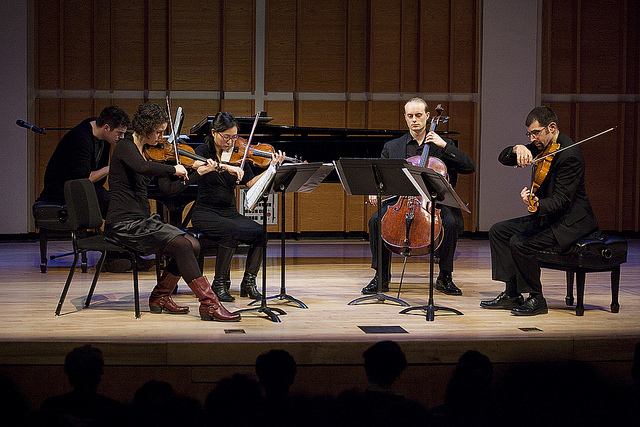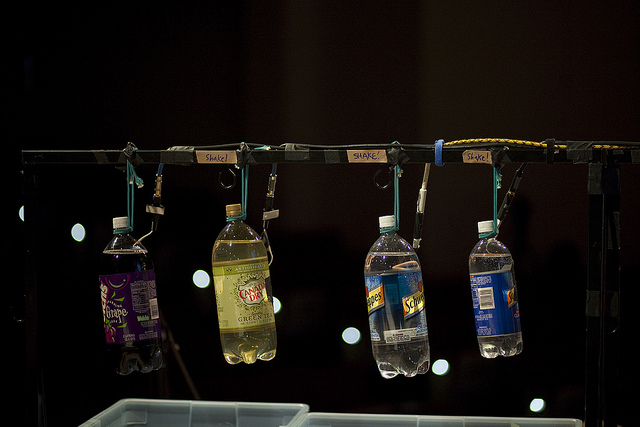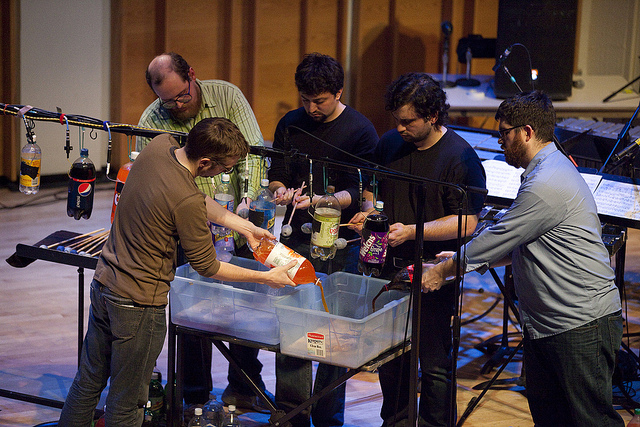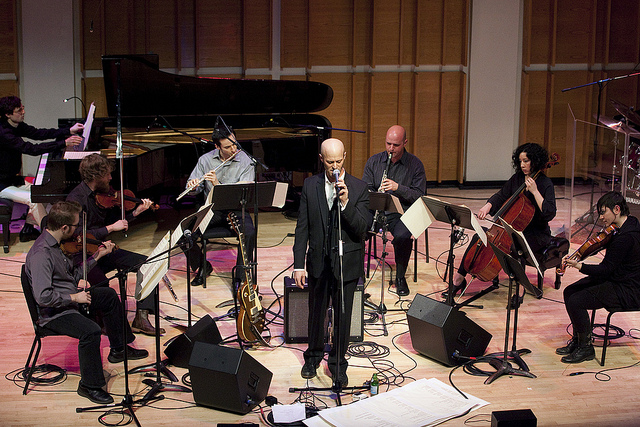Note: Because the Ecstatic Music Festival is in large part meant to highlight brand new works that are born from collaboration between artists, for the purpose of these reviews, the focus will be solely on compositions that were premiered during the festival's first week.
The Ecstatic Music Festival actually began with a soft open of sorts -- a Monday marathon culminating in the contemporary chamber band Victoire's promising collaboration with the avant-rock duo known as Buke and Gass, a creative partnership that composer and Victoire leader Missy Mazzoli assured me would continue.
But it wasn't until the following Wednesday, January 19, that the festival felt officially "on." The evening featured the Chiara String Quartet, presenting the third installment of its four-part Creator/Curator series, in which the ensemble chooses four American composers to write a new string quartet and then build an evening's worth of music around the new composition.
The featured composer on this night was Nico Muhly, who took the opportunity to shed light on the works of a composer--friend and frequent collaborator Valgeir Sigurdsson--who is known largely for his work as a studio producer. Interestingly, despite having the pretense of a Muhly-centric evening, the works of Sigurdsson were more prominently featured.
 Nico Muhly and the Chiara String Quartet; photo credit by David Andrako
Nico Muhly and the Chiara String Quartet; photo credit by David Andrako
Especially notable was the word premiere of Sigurdsson's string quartet Nebraska, as the composer was inspired by talk of the "big, open spaces" of the Midwestern state where Chiara is based, and its similarities to the landscape of Sigurdsson's native Iceland. Here the artist paints a distinct landscape, one that sounds like an American's view of the unbridled prairie, combined with some unnamed foreign mysticism arriving on the wind. Sigurdsson is offering us the aural image of an America that has been forgotten, or perhaps has only existed in some idealistic dream. This America is always earnest and true, simultaneously stern and tender, somehow unsullied.
Muhly's new string quartet, entitled Diacritical Marks, proved to be a supremely satisfying work of musical architecture, an eight-movement piece bookended by Debussian pizzicato articulations, col legno technique, and expressionistic hocketing. The odd-numbered inner movements--III, V, and VII--utilized duets to highlight the work's central melodic/harmonic theme. As with several of Muhly's other chamber works, there is an unabated longing, but it is an aloof passion indifferent to anything but itself, seemingly fragmented by an unspoken, torturous loneliness.
As a cohesive concert of music, the programmatic focus on Muhly/Sigurdsson was deeply rewarding, and arguably the most successful of the week.
The very next night, January 20, electronic artist and composer Dan Deacon and the quartet So Percussion collaborated before a sold-out crowd in the world premiere of Deacon's Ghostbuster Cook: The Origin of the Riddler.
 Photo credit: David Andrako
Photo credit: David Andrako
From the very beginning of this four-part composition for various percussion instruments and electronics, it was clear that this wasn't Dan Deacon as usual. A total of eight unopened soda bottles of varying colors and sizes were suspended from a rig and mic'd. The sound of striking the bottles with mallets was then processed through Deacon's electronics, which resulted in something vaguely resembling gamelan music. In the second movement, the decidedly Asian aesthetic continued with raucous drumming reminiscent of the taiko ensembles of Japan, as Deacon blazed a pentatonic scale-based melody in the electronics.
If I were asked to surmise which group of people was challenged to expand the palette of their musical tastes more--indie fans predisposed to Deacon's idiosyncratic electro-pop, or listeners partial to the avant-garde "new music" of the contemporary classical world--I would have to say the former. Particularly in the third section of the piece, which consisted largely of the soda bottles slowly emptying into large plastic bins, and the accompanying ambient hiss of the liquid draining from the containers, the restlessness of the audience was palpable, and in the case of one listener who asked aloud, incredulously, "Are you serious?"--audible. The fourth movement, which consisted of melodic percussion, did not begin until the soda stopped leaking from all of the bottles. This sense of pacing required a patience I would venture to say most audience members--especially those accustomed to the instant accessibility of Deacon's solo electronic work--were not prepared to exhibit.
 Dan Deacon with So Percussion; photo by David Andrako
Dan Deacon with So Percussion; photo by David Andrako
While the distinct, one-of-a-kind quality of the performance can't be denied, Ghostbuster Cook at times felt like a piece being workshopped as opposed to a finalized work. This feeling was accentuated by the somewhat simplistic approach to the instrumentation: two sections devoted to the aforementioned bottles, another devoted largely to drums, and still another to vibraphones, bells, and xylophones. That caveat notwithstanding, The Origin of the Riddler is a story I'd love to hear again, and its genre-less musical nature was ideally suited to the ethos of the Ecstatic Music Festival.
The festival's first week closed with the first complete performance of Jefferson Friedman's multi-song work On in Love, featuring vocalist Craig Wedren and the chamber group ACME (American Contemporary Music Ensemble). This collection of songs, lacking an overarching narrative or thematic thread that would qualify it as a song cycle, exists simply as an album of songs. The music is at once modern rock and contemporary classical, and yet neither of those things.
 ACME with vocalist Craig Wedren; photo by David Andrako
ACME with vocalist Craig Wedren; photo by David Andrako
The first song of the collection, "Warz," was sonically dense, with the strings bathed in distortion and possessing an indefatigable intensity. A dreamlike aura inhabited the collective timbre of the ensemble throughout. Wedren's supremely controlled, pop-inflected vocal delivery--with its engrossing balance of power and delicacy--belied the complex melodic phrases that embedded themselves within the harmonic framework even while moving freely within it. Composer Jefferson Friedman envisions On in Love as a "record," and accordingly, it will be exceedingly interesting to hear how the piece translates in its ideal setting--the recording.
If Ecstatic's first few concerts are any indication, this festival will be too engaging, too thought-provoking, and too musically compelling to pass up.
For more on the photography of David Andrako, visit http://davidandrako.com.
